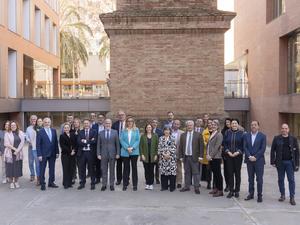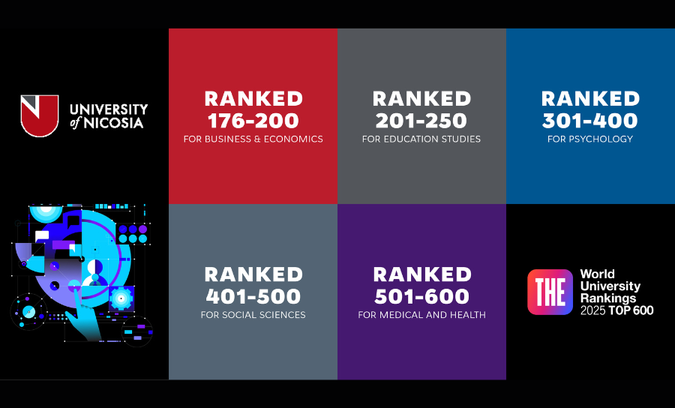Information
Joint degree by: Open University of Cyprus, School of Pure and Applied Sciences and University of Cyprus, Department of Psychology and Department of Computer Science.
OBJECTIVES OF THE PROGRAMME
Since the inception of the computing paradigm, the prevalent metaphor for a computer has been that of a multi-purpose tool, as exemplified by the use of “command lines” and “desktops” at the interface between humans and computers. The unparalleled prevalence of computing-enabled devices in our everyday lives, and the widespread access to information over the Web, suggests a more apt metaphor for a modern computer, that of an assistant. Humans no longer use, but rather collaborate with their devices to solve a cognitive task, with each party learning and adapting to the capabilities of the other. Communication and decision-making happens at a level that is transparent to, and cognitively-compatible with, human abilities and limitations. One no longer speaks of human-computer interaction, but of human-computer symbiosis.
To teach the new paradigm of cognitive computing, the M.Sc. Program in Cognitive Systems brings together two main scientific areas: Cognitive Psychology, and Artificial Intelligence in Computer Science. Aiming, on the one hand, for the prospective students to understand the basis for human cognition, the Program is strongly influenced by Cognitive Psychology and includes learning modules that explore the fundamentals of perception, learning, mental representation, and reasoning in humans. Aiming, on the other hand, for the prospective students to be able to design cognitive systems, the Program places its emphasis on the investigation of computational methods and tools for understanding and designing cognitive systems, and includes learning modules from Connectionist and Symbolic Artificial Intelligence, from Machine Learning, and learning modules on recent developments in Cognitive Computing.
Courses are offered from both Cognitive Psychology (CP) and Computer Science (CS), organized in five main themes: Foundations, Perception, Learning, Reasoning, Systems.
GRADUATES CAN BE EMPLOYED – CAREER PROSPECTS
With a Master’s in Cognitive Systems, graduates have employment opportunities in the two traditional areas of Cognitive Psychology and Computer Science, but also in the new emerging area of Cognitive Systems. Generally speaking, graduates of the program will be qualified to contribute to basic and applied research aiming at the optimization of human-computer interaction and/or the application of computational tools in the understanding of cognition (research, research and development, and research and innovation at public and private centers/companies). In particular, students will be able to work in organizations in the areas of intelligent systems, machine learning, human-computer interaction, and cognitive system development, with large companies such as IBM, Google, Amazon, Microsoft, Facebook, and Apple actively seeking, and offering lucrative salaries for, employees in the emerging areas that are covered by the program of study. Their ability to design and develop systems also offers the opportunity to graduates to work as developers in large software companies, with the ability to incorporate in the traditional software development cycle novel and cutting-edge techniques that are inspired by human cognition. The graduates’ knowledge of cognitive psychology theories and methodologies will further allow them the choice of working in treatment and health facilities, helping people with cognitive disabilities, while exploiting their expertise in the development of cognitive systems to develop novel solutions for patients. Irrespectively of the focus of their studies, graduates will be well-versed in an exciting new area of research that can lead them to pursue a Ph.D. program at Open University of Cyprus, University of Cyprus, or at other competitive Ph.D. programs across the world.
ACCREDITED - Cyprus Agency of Quality Assurance and Accreditation in Higher Education
The Open University of Cyprus (OUC), through its participation in the European project "Liaison Offices with the Labour Market", offers to students of all its programmes of study, the optional and free of charge Thematic Unit (i.e. Module) entitled "Industry Placement". This module provides students opportunities for a placement to gain professional experience in their particular field of study, and the hosting institution can be any public or private organisation operating in the Republic of Cyprus.
Each student has the right to participate in this offering once or twice during his / her studies, provided that s/he meets the required conditions.
Program
The Program consists of 120 ECTS units taught over four semesters of full time study. Each course in the Program is 10 ECTS units, while an optional thesis (taken in the place of three courses) is 30 ECTS units.
Students are required to take the three first courses under the Foundations theme (COS511, COS512, COS513), where at least the two introductory courses (COS511, COS512) are expected to be taken during the first semester. The remaining program comprises electives among all the other courses, as long as at least one third of the courses come from Cognitive Psychology (CP), and one third of the courses come from Computer Science (CS). It is advisable that at least one course is taken from each theme, to guarantee breadth of coverage.
Indicative Structure for full time study, with emphasis on Cognitive Psychology:
Semester 1
- COS511 Introduction to Cognitive Psychology
- COS512 Introduction to Artificial Intelligence
- COS513 Computational Intelligent Systems
Semester 2
- COS521 Cognitive Knowledge Acquisition
- COS522 Learning and Memory in Humans
- COS523 Human Perception and Attention
Semester 3
- COS611 Cognitive Modelling
- COS612 Mental Representations and Reasoning
- COS613 Cognitive Agents and Reasoning OR Thesis
Semester 4
- COS621 Experimental Psychology
- COS622 Cognitive Neuroscience OR Thesis
- COS623 Cognitive System Design OR Thesis
Indicative Structure for full time study, with emphasis on Computer Science:
Semester 1
- COS511 Introduction to Cognitive Psychology
- COS512 Introduction to Artificial Intelligence
- COS513 Computational Intelligent Systems
Semester 2
- COS521 Cognitive Knowledge Acquisition
- COS522 Learning and Memory in Humans
- COS524 Natural Language Processing
Semester 3
- COS611 Cognitive Modelling
- COS613 Cognitive Agents and Reasoning
- COS614 Adaptive and Interactive Systems OR Thesis
Semester 4
- COS621 Experimental Psychology OR Thesis
- COS623 Cognitive System Design
- COS624 Topics in Data Science OR Thesis
Other course combinations are possible, subject to the offering of the courses each semester. It is expected that courses will be offered as follows, with the possibility of repeating some course offerings in both semesters: Fall Semester: Foundations, Reasoning; Spring Semester: Perception, Learning, Systems.
All elective courses, including the above ones and any others that may be offered in the future, are offered subject to sufficient demand.
Students wishing to register for certain courses and obtain a certificate of completion, without an interest in gaining the full degree, can opt to do so, with pro rata tuition fees on the number of courses for which they choose to register.
Method of Instruction
Courses are taught in English using a blended distance learning methodology. Students have live online weekly meetings with their course instructors, which are recorded and available for offline viewing as well. Course forums are used to interact with the instructors asynchronously, and all relevant educational activities, course assignments and submissions, etc., are done online via the course’s educational platform. Coursework includes biweekly assignments and class projects. Final exams are taken in-class at the student’s country of residence or in designated exam centers in Cyprus and abroad (subject to factors and conditions determined by the University). Students also have the option of attending a summer camp in Cyprus.
Recommended Programs
News

The Open University of Cyprus and …

Rectors from 10 universities in 9 …

Open University of Cyprus and Royal …

New Erasmus+ Research Project: “ADMIT: generative …










